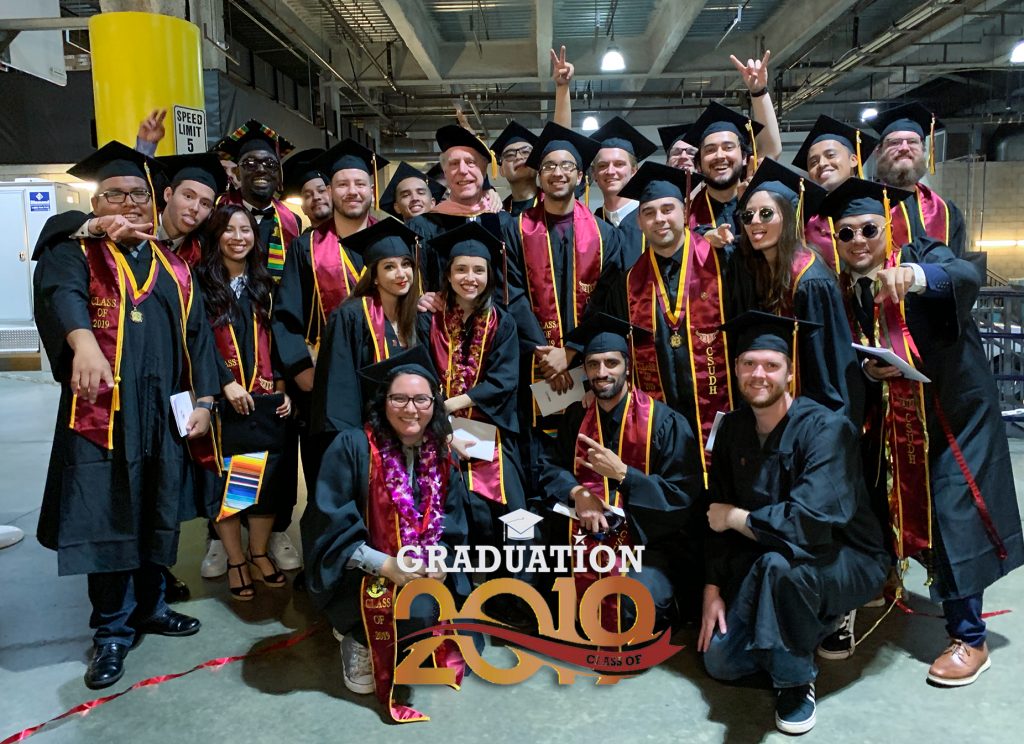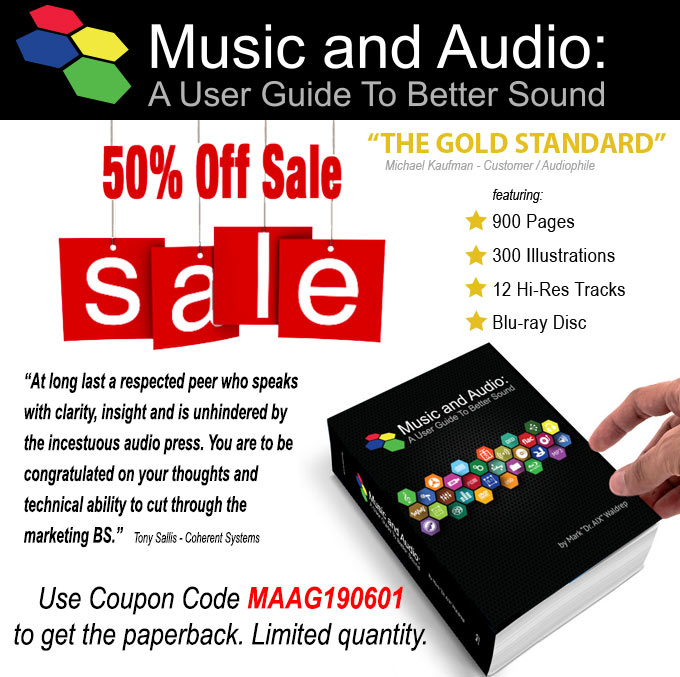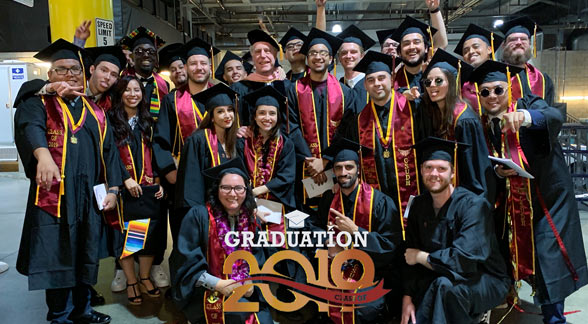Graduation Day 2019!
The Class of 2019 walked across the riser at CSU Dominguez Hills at yesterday morning at the 9 am graduation ceremony. I couldn’t be more proud of the DMA Recording Arts students that received their degrees in Digital Media Art with a concentration in Audio Recording. They not only met all of the requirements for the degree, passed the DMA courses — including the very challenging ones that I teach, and produced a capstone senior project, they excelled. Really! The quality of the CDs presented during the final senior crits was astounding. The bands were interesting, the productions solid, and the mixing/mastering very well done. As I listened, I couldn’t help but be impressed. To all of the CSUDH DMA Recording Arts graduates, congratulations on a job well done! Now go out there, bring your new skill to the industry, and make your stamp on the world of audio.

If anyone is looking to hire an entry level audio engineer, please feel free to contact me. There is tremendous potential in this group.
Kudos for the Book!
The 50% sale continues on the Music and Audio: A User Guide to Better Sound until the end of the month. If you’ve considered getting a copy of the “gold standard” of reference books on high-end audio and definitive demo disc, now is the ideal time to purchase the 880-page paperback and accompanying Blu-ray disc for 50% on the paperback (Note the discount only applies to the physical paperback book).
Here’s a few comments from some recent customers:
“I just got your book and wanted to thank you for saving me a lot of money! Your explanation of the various formats, how and what to shop for were immediately useful during my recent system upgrade. Astounding work!”
“I thoroughly enjoyed your book and have read it from cover to cover. I purchased a second copy to send to my son who is an aspiring musician and recording engineer. Thanks for your impressive effort!”
“The tracks and comparisons on the Blu-ray disc were very helpful in my understanding of high-resolution and all of the different formats. I’ve been reading your blog for years but finally understand what you’ve been talking about. I was especially shocked to hear the different mastering levels applied to your acoustic guitar recording. Why can’t the labels provide us with the best fidelity? Your book was the best audio purchase I’ve made in a long time!”
Thanks to all of you that have purchased the book and thanks for taking the time to share your thoughts.
++++++++++++++++++++++++++++++++++++++++++++++++++++++++++++++

++++++++++++++++++++++++++++++++++++++++++++++++++++++++++++++++
HD-Audio Study: The Next Step…
Now that summer has arrived and I’ve got more free time, I’m going to start preparing the files for the upcoming HD-Audio perceptibility study. I’ve received a number of comments and suggestions about the proposed study. Some have encouraged me to use tracks from other labels including downloads from HDtracks and other sites. There’s a couple of reasons why doing so won’t work. I’m restricted from distributing the intellectual property of other record labels. They would come after me. Secondly, virtually all of the “so-called” high-resolution content available on those sites isn’t really high-resolution and therefore wouldn’t be suitable for this investigation.
The selection of the individual tracks is not tremendously important as long as I can provide a wide variety of genres from my own catalog — and I’m very confident that I can. The only firm requirement is that they are bona fide hi-res tracks. In fact, if any of you have suggestions that you believe would make good candidates for the study, please free free to contact me. I will be offering 20 tracks in a variety of genres and played by different ensembles/artists.
Several people also suggested that I take standard resolution recordings and upconvert them to high-resolution and see if listener’s can tell them apart. While I admit that I like the idea, it answers a different question — one that I think is beyond the scope of my simple survey. I want to establish whether a real hi-res music selection can be reliably distinguished from a downconverted version of the same track.
Finally, I received a few emails criticizing my methodology. “Your proposed study will be useless unless you conduct it under strictly controlled conditions. Any submissions you receive cannot be trusted! Participants can and will cheat. It’s probable that proponents of hi-res audio — manufacturers and organizations — will falsify results and submit them.”
After having written a couple of recent blogs on honesty in audio and fake demos, it’s certainly possible that people will cheat and try to skew the results in one direction or another. But I trust my readers to submit honest results and attest to that fact with a statement saying they didn’t cheat. Is the issue of hi-res audio so important that people would be willing to falsify their submissions? I can think of a lot more important issues in this day and age. I trust my readers.
I also like the idea of having people do this survey on their own time and using their own systems. Several prominent writers routinely criticize studies like the one I’ve proposed by saying, “your study will only show that listeners couldn’t tell the tracks apart on that particular system in that particular room on that particular day — therefore it is invalid.” Or “most of your listeners don’t own system with ‘sufficient resolution’ or “resolving power’ to show the very subtle differences hi-res audio delivers.” These criticisms are nonsense.
I’m interested in whether enthusiastic music listeners with moderate to very good playback systems can perceive differences between hi-res and standard-res audio tracks. This survey may not definitively answer the question but I believe it can make a meaningful contribution to the discussion.
Stay tuned…


I am looking forward to participating in your study! My suggestion for it: Consider doing a follow-up study that only includes all the individuals who successfully pick out all the high-res tracks. This would be very enlightening because maybe only a small percentage of people are able to pick out high-res (due to ears/listening experience and/or having a highly resolving system), but they’re able to do it consistently! And sometimes that number is small enough that it’s obscured in the group statistics. So, you should consider having a way to contact any individuals who submit results to you so you have that option.
How about cooperating with Archimago?
He certainly knows a thing or two about methodology when making such tests.
Hey Mark,
No need to post this message online… Was wondering if you’ll be heading off to RMAF in early September?
I’ll see how work goes, but if I can swing it, would love to check it out and if you’re there, will certainly come by :-). Lemme know!
Congrats on yet another successful class this year!
I look forward to trying this again. My only suggestion would be to keep the tracks relatively short – maybe a minute or so. When a group of us did your previous challenge, we found listening to the complete tracks irksome so when we ran the challenge a second time I only played about the first minute of each track. If you are not going to hear any difference (which is what I suspect will be the outcome) you are not going to hear it however long the tracks are.
If the tracks are short, the usual audiophile complaints will show up: “You can only perceive a difference through long-term listening”.
So I actually think having complete tracks, maybe even also offering all the tracks as one long, sequenced file, which can then be used in an ABX test, would possibly make the test even better, and it would also eliminate the usual complaints about long-term listening and being forced to switch (in an ABX test) after not having listened long enough.
With a, say, one to two hour long file that can be used in an ABX test, as well as single files, all possible complaints will be eliminated, except for the usual audiophile paranoia and desire to argue that can’t be controlled for.
Thanks for the thoughts…I’m getting closer to the initial preparation.
Congratulations for your students! I’m glad to hear that you were so happy with them, and I wish them all the best in the future.
As for your upcoming study, as mentioned earlier I would be happy to participate, but I do think the best way by far would be to use ABX tests (prererably with 16 trials). That way there will be no cheating or at least it will be extremely unlikely that anyone will be able to cheat. As I do have quite some experience with ABX tests I would be very happy to assist :-).
Although I also would like to trust people, then my experience unfortunately tells me that many people involved in audio have massive ego problems, and even public figures in audio have used sockpuppets, etc., and when I look at all the screaming and haugty lecturing I’ve seen go in the 5 years I have really been into audio/hi-fi, then it wouldn’t surprise me if someone chose to cheat, since they both hate blind tests and call them invalid, while at the same time they want to take the tests to show off to everybody that they can ace the tests, and they have the aforementioned ego problems – this also includes people that I’ve met in real life, even people I consider friends.
So, although I agree that there are more important things in life, to some people there apparently aren’t :-/
Just to add (you can add this to the end of my comment if you like):
We should expect some people to get 100 % scores or close to it. I think those people should be examined again to avoid flukes. Also, if an ABX test is used with at least 16 trials it will be extremely difficult to get such a high score simply by guesswork. But of course, they do get that good scores and can repeat it, then they can hear a difference :-). I have passed many blind tests, even listening from my kitchen (seriously), and getting 15 or 16 out of 16 correct.